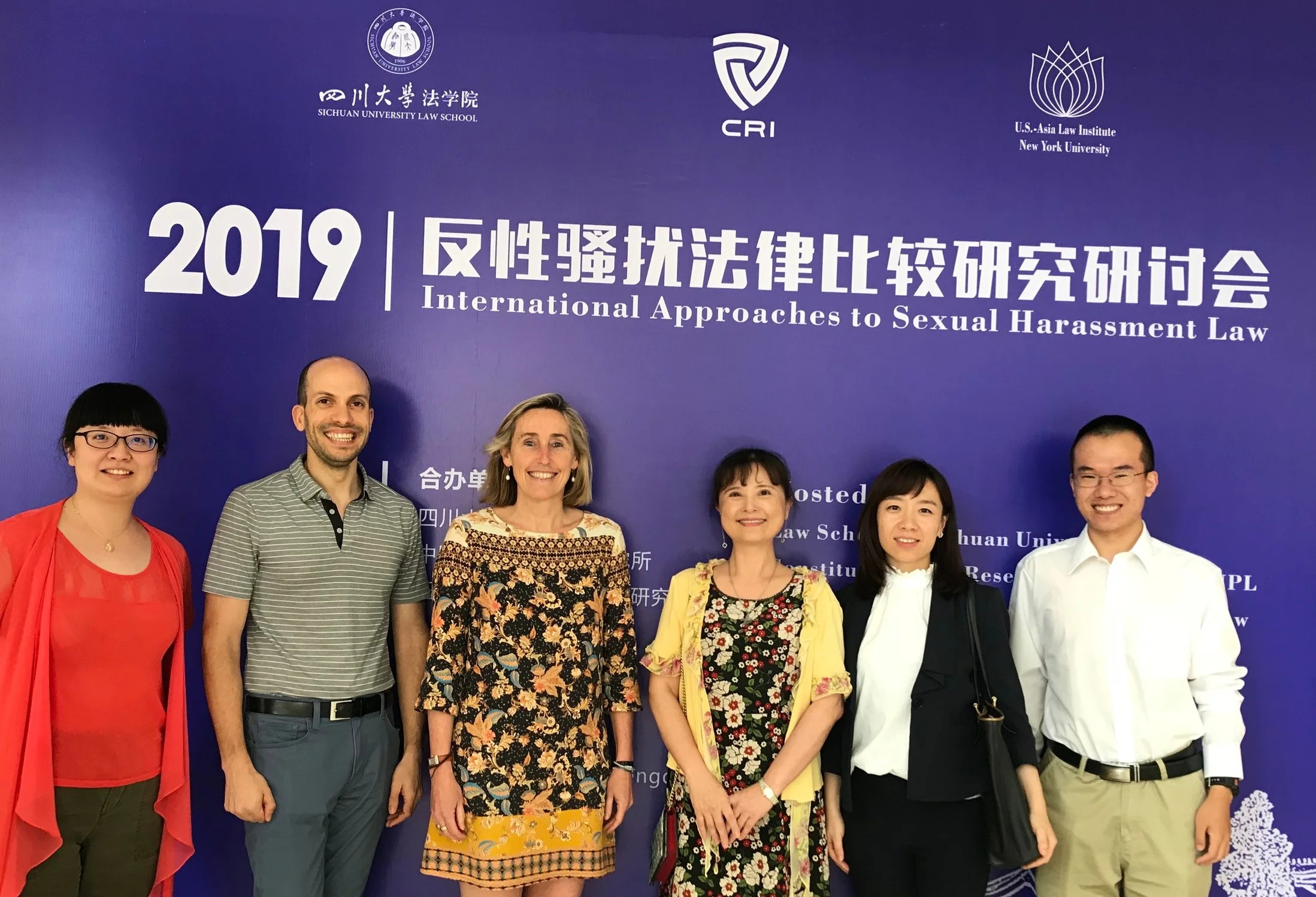(L-R) Amy Gao, Aaron Halegua, Marie Mercant, ChinChin Cheng, Chao Liu & Dong Yifu
From June 1 – 2, 2019 the U.S.-Asia Law Institute held a conference called “International Approaches to Sexual Harassment Law” in partnership with Sichuan University Law School in Chengdu, China. Participants included Professors Zhou Wei and Li Cheng of Sichuan University, Liu Xiaonan of China University of Political Science and Law (CUPL), USALI Affiliated Scholar Aaron Halegua, and Marie Mercat, Associate Law Professor in Private Law and Labor and Employment Law at the Conservatoire National des Arts et Métiers. Workshop participants explored anti-discrimination cases, remedies, standards and enforcement mechanisms from a comparative perspective.
Day 1: International Developments
The first day was dedicated to discussing recent developments in international standards in Chinese law, which included international standards in sexual harassment vs. gender discrimination; the International Labor Organization Convention on Gender Violence and Workplace Harassment, as well as recent developments on sexual harassment in China, Taiwan, France/EU and the United States.
After introductions from representatives from the International Labor Organizations (ILO) and Equality, an NGO combating gender violence, experts introduced the legal frameworks for anti-discrimination and sexual harassment in China, France, and Taiwan. During the discussion, the following issues evoked enthusiastic discussion: confidential settlement agreements, Taiwan's experience in addressing on campus sexual harassment and employer responsibility, recent developments in the US discouraging confidential agreements through taxation. The day concluded with a panel on employer responsibility for sexual harassment and safety, including the legal obligation under the law, the integration into employer’s general obligations in France, and the protection of witnesses and victims against retaliation.
Day 2: Dispute Resolution & Administrative Agencies
Day two began with a comparison of dispute resolution in Taiwan, France, and the United States. Professor ChinChin Cheng of National Chung Cheng University in Taiwan opened the workshop discussing the procedure and structure of sexual harassment dispute resolution mechanisms in Taiwan. She emphasized that when designing a dispute resolution system, it is important to create mechanisms which limit its abuse, e.g. people who making a living by bringing complaint after complaint against employers for hiring discrimination. Following this discussion, Professor Mercat introduced the administrative agency in France that was established as a constitutionally independent agency: defender of rights, its function and procedures. Aaron Halegua then introduced the function of Equal Employment Opportunity Commission (EEOC) and discussed the necessary procedures for establishing such an agency, and whether it should be deemed a mandatory prerequisite procedure; an individual’s choice to enter into a settlement; or the government’s right. The panel concluded with a discussion of alternative organizations in China which fulfill similar roles to the EEOC, such as unions, the Women’s Federation and Youth League. The day concluded with a discussion on the role litigation should play in resolving sexual harassment disputes. Professor Liu Minghui of China’s National Women’s University discussed the importance of litigation in Chinese provinces that have more advanced local regulations and introduced several cases that exposed problems within the legal framework. On this panel, the issues of burden of proof, admissibility of certain types of evidence and remedies were also discussed.
The event concluded with Affiliated Scholar Aaron Halegua reflecting, “My real goal for this [workshop] is that foreign experience will give some thoughts and ideas to Chinese participants as they debate what is happening in China today. And if that is the criteria, I think that [this workshop] was a big success. Listening the discussion this afternoon, talking about how to influence the real law…I think that is really successful.”
